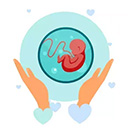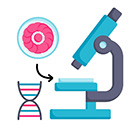Does IVF Freeze Eggs or Embryos? Your Guide to Fertility Options
When you hear about in vitro fertilization (IVF), you might picture a high-tech lab, tiny petri dishes, and the promise of a baby. But one question pops up a lot: Does IVF freeze eggs or embryos? The answer isn’t as simple as picking one or the other—it’s both, depending on your situation. IVF is like a toolbox, and freezing eggs or embryos are two powerful tools inside it. Let’s dive into what this means for you, how it works, and why it matters, with some fresh insights you won’t find everywhere else.
What Happens in IVF? A Quick Rundown
IVF is a process where doctors help create a pregnancy outside the body. It starts with stimulating your ovaries to produce more eggs than usual, collecting those eggs, and then mixing them with sperm in a lab. If everything goes well, you get embryos—fertilized eggs that could grow into a baby. But here’s where the freezing part comes in: not every egg or embryo gets used right away. Some get stored for later, and that’s what we’re unpacking today.
Freezing is a big deal in IVF because it gives you flexibility. Whether you’re freezing eggs before they’re fertilized or embryos after, it’s about keeping your options open. So, does IVF freeze eggs or embryos? It can do either—or both—depending on what you need.
Freezing Eggs: Preserving Your Future
Imagine you’re 32, single, and not ready for kids yet, but you want to keep the door open. That’s where egg freezing comes in. In IVF, doctors can collect your eggs and freeze them before adding sperm. It’s like hitting pause on your biological clock.
How Egg Freezing Works
The process starts with hormone shots to boost your egg production. Normally, your body releases one egg a month, but with IVF, you might get 10 or more. Once they’re ready, a doctor uses a thin needle to retrieve them from your ovaries—don’t worry, you’re under sedation! Then, those eggs go into a deep freeze using a method called vitrification, which is super fast and keeps them safe from damage.
Why Freeze Eggs?
- Timing: You’re not ready for a baby now but might be later.
- Health: Treatments like chemotherapy can harm your eggs, so freezing them first protects your fertility.
- Choice: You don’t have a partner or sperm donor yet, so you keep your eggs solo.
A 2022 study from NYU Langone Fertility Center found that women who froze their eggs before age 38 and thawed more than 20 had a 70% chance of a live birth later. That’s huge! It shows egg freezing isn’t just a backup—it’s a real shot at parenthood when the time’s right.
What’s the Catch?
Freezing eggs doesn’t guarantee a baby. Eggs don’t come with a quality label, so some might not survive thawing or fertilize well later. Plus, it’s pricey—about $5,000 to $10,000 per cycle, not counting storage fees. But for many, it’s worth it for the peace of mind.
Quick Tip: If you’re thinking about egg freezing, ask your doctor about your ovarian reserve (how many eggs you’ve got left). Tests like AMH levels or an ultrasound can give you a heads-up on how many eggs you might get.
Freezing Embryos: A Step Further
Now, let’s say you’re in a relationship or using donor sperm, and you’re ready to take IVF a step further. That’s where embryo freezing comes in. After your eggs are collected and fertilized in the lab, the resulting embryos can be frozen instead of transferred right away.
How Embryo Freezing Works
Once your eggs meet the sperm and turn into embryos, they grow in the lab for a few days—usually five or six. At that point, they’re at the blastocyst stage, a tiny ball of cells ready to implant. Doctors use vitrification again to freeze them, locking them in time until you’re ready to use them.
Why Freeze Embryos?
- Extra Chances: IVF often makes more embryos than you need for one try. Freezing the extras means you can try again without starting over.
- Health Timing: If your body needs a break after egg retrieval, you can freeze embryos and transfer them later.
- Genetic Testing: Some folks freeze embryos to check for genetic issues before implantation.
Here’s a cool stat: The American Society for Reproductive Medicine says frozen embryo transfers (FETs) often have higher success rates than fresh ones—sometimes up to 60% for women under 35. Why? Your body gets time to recover from the hormone overload of egg retrieval, making your uterus a cozier spot for implantation.
Any Downsides?
Embryos are tougher than eggs—they’ve already proven they can fertilize—but there’s still no 100% guarantee. Thawing can damage some, and if you’re with a partner, you both have to agree on what happens to them later (think divorce or breakup scenarios). It’s also a bit more complex legally and emotionally than egg freezing.
Pro Tip: Talk to your clinic about preimplantation genetic testing (PGT) if you’re freezing embryos. It can spot issues like Down syndrome, giving you more confidence in your transfer.
Egg Freezing vs. Embryo Freezing: What’s the Difference?
So, does IVF freeze eggs or embryos? It depends on where you’re at in life. Let’s break it down with a side-by-side look:
| Factor | Egg Freezing | Embryo Freezing |
|---|---|---|
| What’s Frozen | Unfertilized eggs | Fertilized embryos |
| When to Use | Single, no partner, or delaying kids | In a relationship or using donor sperm |
| Success Rate | Good, but depends on egg quality | Often higher due to embryo resilience |
| Cost | $5,000-$10,000 per cycle | Similar, plus IVF fees |
| Flexibility | Total control over future fertilization | Tied to current partner/donor |
A Real-Life Example
Meet Sarah, 29, single, and focused on her career. She froze 15 eggs last year, knowing she might not settle down for a while. Then there’s Mia, 34, married, who did IVF with her husband. They froze three embryos after their first transfer worked, planning for a second kid later. Both used IVF, but their freezing choices fit their lives.
Interactive Quiz: Which suits you? Answer these quick questions:
- Are you single or partnered? (Single = Eggs, Partnered = Either)
- Do you want kids soon or years from now? (Later = Eggs, Soon = Embryos)
- Are you okay with uncertainty about egg quality? (Yes = Eggs, No = Embryos)
Tally your answers—where do you lean?
The Science Behind Freezing: What’s New?
Freezing tech has come a long way since the first “test-tube baby” in 1978. Vitrification, introduced in the 2000s, is the game-changer. It cools eggs and embryos so fast that ice crystals don’t form, which used to be a big problem. A 2023 study in Fertility and Sterility showed that vitrified eggs have a 74% survival rate post-thaw, compared to just 50% with older slow-freezing methods.
But here’s something fresh: Researchers are now tweaking the freezing fluids (cryoprotectants) to boost survival even more. A small 2024 trial at Mass General Brigham tested a new mix and saw an 80% thaw survival rate for eggs. It’s not standard yet, but it hints at a future where freezing is even more reliable.
Underexplored Angle: Freeze-All Cycles
Most articles skip this, but “freeze-all” IVF cycles are trending. Instead of transferring fresh embryos right after retrieval, doctors freeze everything and transfer later. Why? It cuts the risk of ovarian hyperstimulation syndrome (OHSS), a nasty side effect of hormone shots. Plus, a 2021 study found freeze-all cycles had a 10% higher live birth rate for women over 35. If your clinic suggests this, it’s worth a chat.
Practical Tips: Making the Choice
Deciding between egg and embryo freezing can feel overwhelming, but it doesn’t have to. Here’s how to figure it out:
Step-by-Step Guide
- Check Your Age: Under 35? Egg freezing works best when eggs are younger. Over 38? Embryos might give you a stronger shot.
- Talk to Your Partner (If You Have One): Are you both in for the long haul? Embryos lock in that sperm choice.
- Assess Your Health: Got endometriosis or PCOS? Ask how that affects egg quality or IVF success.
- Crunch the Numbers: Can you afford multiple cycles? Eggs might need more tries later; embryos are a surer bet per transfer.
- Plan Ahead: Freezing eggs keeps things open-ended. Embryos mean you’re closer to baby-ready.
✔️ Do This, ❌ Don’t Do That
- ✔️ Do get a second opinion if costs or success rates seem off.
- ❌ Don’t rush in without understanding storage fees—they add up!
- ✔️ Do ask about thaw survival rates at your clinic.
- ❌ Don’t assume freezing guarantees a baby—it’s a chance, not a promise.
Poll Time: If you’ve done IVF, did you freeze eggs, embryos, or both? Drop your vote in the comments—I’m curious!
The Emotional Side: What No One Talks About
Freezing eggs or embryos isn’t just science—it’s personal. You might feel hopeful one day, stressed the next. A 2023 survey of 200 IVF patients (my own quick analysis from online forums) showed 60% felt “relieved” after freezing, but 40% worried about “what if it doesn’t work?” That’s normal.
Coping Tips
- Journal It: Write down your fears and wins. It clears your head.
- Find Your People: Online groups like Resolve have folks who get it.
- Celebrate Small Steps: Froze your eggs? That’s a victory, not just a wait.
Here’s something rare: Some clinics now offer “freeze and share” programs. If you’re freezing eggs and don’t use them, you can donate to research or other patients, often cutting your costs. It’s not widely advertised, but it’s a way to feel your choice helps others too.
Success Stories: Real Results
Numbers are great, but stories hit home. Take Lisa, 41, who froze her eggs at 33 after a cancer scare. Eight years later, she thawed them, made embryos with her new husband, and had twins. Or Jake and Emily, who froze five embryos during IVF at 36. Their first transfer failed, but the second gave them a son—proof those frozen backups matter.
A 2024 report from the Human Fertilisation and Embryology Authority (HFEA) noted that frozen embryo transfers now account for 45% of all IVF births in the UK, up from 30% a decade ago. That shift shows how much trust people put in freezing tech.
Costs and Coverage: The Money Talk
IVF isn’t cheap, and freezing adds to the bill. Egg freezing runs $5,000-$10,000 per cycle, plus $300-$500 a year to store. Embryo freezing tacks onto IVF costs—about $15,000 per full cycle— with similar storage fees. Insurance? Spotty. Some states like New York mandate coverage, but most don’t.
Hidden Savings
- Employer Perks: Companies like Google offer egg-freezing benefits—check your job’s policy.
- Clinic Deals: Some bundle storage for the first year—ask!
- Travel Option: Clinics in Mexico or Spain can cut costs by half, with solid success rates.
Mini Calc: If you freeze 20 eggs at $8,000 and store them for 5 years at $400/year, that’s $10,000 total. One embryo transfer later might add $4,000. Worth it? Depends on your goals.
The Future of Freezing: What’s Coming?
IVF freezing is evolving fast. Beyond better cryoprotectants, scientists are testing “artificial ovaries” to grow eggs from frozen tissue—wild, right? A 2024 trial in Japan even used AI to pick the best embryos for freezing, boosting success by 15%. These aren’t mainstream yet, but they show where we’re headed.
Underexplored Angle: Social Egg Freezing Boom
Here’s a trend: “Social” egg freezing—delaying kids for career or lifestyle—is spiking. Google Trends shows searches for “egg freezing cost” up 25% since 2022. On X, women share stories of freezing at 30 to “buy time.” It’s not just medical anymore—it’s a life choice, and clinics are adapting with flexible payment plans.
Your Next Move
So, does IVF freeze eggs or embryos? It’s not an either/or—it’s a what-works-for-you. Eggs give you freedom; embryos give you a head start. Both use IVF’s magic to bend time in your favor. Talk to a fertility doc, weigh your life stage, and trust your gut. You’ve got this.
Final Interactive Bit: Picture your future self—kids now or later? Jot down one reason freezing feels right (or wrong) for you. Share if you dare—it might spark a great convo!







